Popular courses 'Padi Diving Course' at Padi Diving Course
Padi Diving Course Study guides, Class notes & Summaries
Looking for the best study guides, study notes and summaries about Padi Diving Course? On this page you'll find 115 study documents about Padi Diving Course.
All 115 results
Sort by
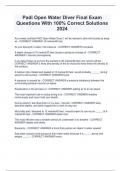 Popular
Popular
-
Padi Open Water Diver Final Exam Questions With 100% Correct Solutions 2024
- Exam (elaborations) • 8 pages • 2024
-
Available in package deal
-
- $14.99
- 2x sold
- + learn more
Padi Open Water Diver Final Exam Questions With 100% Correct Solutions 2024 As a newly certified PADI Open Water Diver, I will be trained to dive with buddy as deep as - CORRECT ANSWER-18 metres/60 feet As you descend in water, the pressure - CORRECT ANSWER-increases A depth change of 10 metres/33 feet causes a pressure change of - CORRECT ANSWER-1 bar/ata (atmosphere) if you take 6 liters of air from the surface to 20 metres/66 feet, the volume will be - CORRECT ANSWER-2 litres (the...
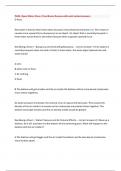
-
PADI, Open Water Diver, Final Exam Review with well stated answers
- Exam (elaborations) • 32 pages • 2024
-
- $16.99
- + learn more
Salt water is heavier than fresh water because it has dissolved minerals in it. This means it causes more upward force (buoyancy) on an object. An object that is neutrally buoyant in fresh water would float in salt water because there is greater upward force. See Being a Diver I - Buoyancy and Controlling Buoyancy.
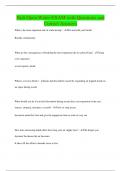
-
Padi Open Water EXAM with Questions and Correct Answers
- Exam (elaborations) • 17 pages • 2024
-
- $11.99
- + learn more
What is the most important rule of scuba diving? - Do not hold your breath Breathe continuously What are the consequences of breaking the most important rule in scuba diving? - Lung over expansion severe injuries, death What is a reverse block? - pain and discomfort caused by expanding air trapped inside an air space during ascent What should you do if you feel discomfort during ascent due to air expansion in the ears, sinuses, stomach, intestines, or teeth? - slow or stop ascent
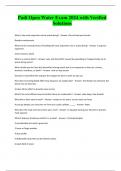
-
Padi Open Water Exam 2024 with Verified Solutions
- Exam (elaborations) • 9 pages • 2024
-
- $9.99
- + learn more
Padi Open Water Exam 2024 with Verified Solutions What is the most important rule of scuba diving? - Answer -Do not hold your breath Breathe continuously What are the consequences of breaking the most important rule in scuba diving? - Answer -Lung over expansion severe injuries, death What is a reverse block? - Answer -pain and discomfort caused by expanding air trapped inside an air space during ascent What should you do if you feel discomfort during ascent due to air expansion in the ...
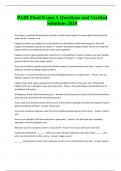
-
PADI Final Exam A Questions and Verified Solutions 2024
- Exam (elaborations) • 4 pages • 2024
- Available in package deal
-
- $9.99
- + learn more
PADI Final Exam A Questions and Verified Solutions 2024 If an object is neutrally buoyant (does not sink or float) in fresh water; the same object placed into salt water would: - Answer -sink. Imagine you blow up a balloon, tie it off, and take it to the bottom of the swimming pool. What will happen to the balloon and the air inside it? - Answer -The balloon will get smaller and the air inside the balloon will be more dense (molecules move closer together). Imagine you turn a glass upside...
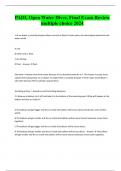
-
PADI, Open Water Diver, Final Exam Review multiple choice 2024
- Exam (elaborations) • 28 pages • 2024
- Available in package deal
-
- $11.49
- + learn more
PADI, Open Water Diver, Final Exam Review multiple choice 2024 1) If an object is neutrally buoyant (does not sink or float) in fresh water, the same object placed into salt water would A sink. B either sink or float. C do nothing. D float. - Answer -D float. Salt water is heavier than fresh water because it has dissolved minerals in it. This means it causes more upward force (buoyancy) on an object. An object that is neutrally buoyant in fresh water would float in salt water because t...
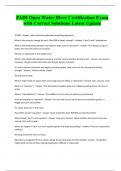
-
PADI Open Water Diver Certification Exam with Correct Solutions Latest Update
- Exam (elaborations) • 12 pages • 2024
- Available in package deal
-
- $10.99
- + learn more
PADI Open Water Diver Certification Exam with Correct Solutions Latest Update SCUBA - Answer -Self contained underwater breathing apparatus What is the pressure change for each 10m/33ft of depth change? - Answer -1 bar/1 ata/1 atmosphere What is the relationship between my depth in water and the pressure? - Answer -The deeper you go in water, the more the pressure increases Pressure is expressed as the weight of air What is the relationship between pressure, and the volume and the density...
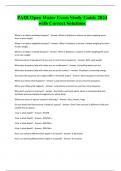
-
PADI Open Water Exam Study Guide 2024 with Correct Solutions
- Exam (elaborations) • 8 pages • 2024
- Available in package deal
-
- $10.49
- + learn more
PADI Open Water Exam Study Guide 2024 with Correct Solutions When is an object positively buoyant? - Answer -When it displaces a volume of water weighing more than its own weight. When is an object negatively buoyant? - Answer -When it displaces a volume of water weighing less than its own weight. When is an object neutrally buoyant? - Answer -When it displaces a volume of water weighing the same as its own weight. Why two pieces of equipment do you use to control your buoyancy? - Answer...
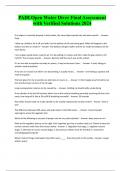
-
PADI Open Water Diver Final Assessment with Verified Solutions 2024
- Exam (elaborations) • 4 pages • 2024
- Available in package deal
-
- $9.99
- + learn more
PADI Open Water Diver Final Assessment with Verified Solutions 2024 If an object is neutrally buoyant in fresh water, the same object placed into salt water would... - Answer - Float I blow up a balloon, tie it off, and take it to the bottom of the swimming pool. What will happen to the balloon and the air inside it? - Answer -The balloon will get smaller and the air inside the balloon will be more dense I turn a glass upside down, trap the air in it by putting it in water, and then I tak...
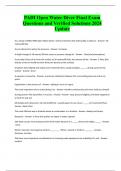
-
PADI Open Water Diver Final Exam Questions and Verified Solutions 2024 Update
- Exam (elaborations) • 7 pages • 2024
- Available in package deal
-
- $9.99
- + learn more
PADI Open Water Diver Final Exam Questions and Verified Solutions 2024 Update As a newly certified PADI Open Water Diver, I will be trained to dive with buddy as deep as - Answer -18 metres/60 feet As you descend in water, the pressure - Answer -increases A depth change of 10 metres/33 feet causes a pressure change of - Answer -1 bar/ata (atmosphere) if you take 6 liters of air from the surface to 20 metres/66 feet, the volume will be - Answer -2 litres (the density of the air would be t...
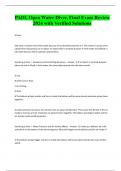
-
PADI, Open Water Diver, Final Exam Review 2024 with Verified Solutions
- Exam (elaborations) • 28 pages • 2024
- Available in package deal
-
- $10.99
- + learn more
PADI, Open Water Diver, Final Exam Review 2024 with Verified Solutions D float. Salt water is heavier than fresh water because it has dissolved minerals in it. This means it causes more upward force (buoyancy) on an object. An object that is neutrally buoyant in fresh water would float in salt water because there is greater upward force. See Being a Diver I - Buoyancy and Controlling Buoyancy. - Answer -1) If an object is neutrally buoyant (does not sink or float) in fresh water, the same...

That summary you just bought made someone very happy. Also get paid weekly? Sell your study resources on Stuvia! Discover all about earning on Stuvia


